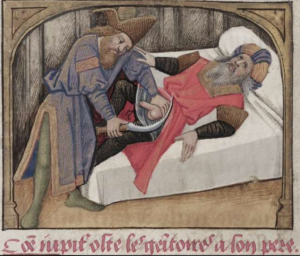Criminal History, 191
For the context of these translations click here.
PDFs of entries 1-183 (several of Karlheinz Deschner’s
books abridged into two) can be read here and here.
Domestic politics: until the genitals were cut off, ‘that no trace of them remained’
In 882, a bloody feud broke out between the Saxons and the Thuringians: between Poppo, the Count of Sorbenmark, and the Frankish Count Egino, whereby we do not learn the reason for the war, but only that ‘Poppo was defeated by the Thuringians with heavy losses’. The next year, too, the same source only laconically reports ‘a cruel war’, which Poppo lost again, ‘as was usual before’. He escaped ‘barely with a few men, while all the others fell’. On the other hand, he was very successful against the Slavs in 880, against Daleminzians, Bohemians, Sorbs ‘and the other neighbours all around, trusting in God’s help, he defeated them in such a way that none of this great multitude remained’ (Annales Fuldenses). He lost his life in 892.
In the Ostmark, Count Aribo raged against the descendants of his predecessors, the sons of the margraves William and Engilschalk, who had fallen in battle against the Moravians in 871, in a two-and-a-half-year slaughter, whereby the marchio even joined forces with the Moravian duke Swatopluk, the vassal of the empire, who supported him militarily on several occasions. After Aribo’s expulsion in 882 by the margrave’s sons, Swatopluk repeatedly raided the Ostmark and killed ‘inhumanly and bloodthirstily like a wolf’. In 884, Pannonia was plundered up to the Raab, most of the country ‘devastated, destroyed and annihilated with fire and sword’. Indeed, the Moravian invaded here a second time in the same year, ‘in order, if anything had remained before, to devour it completely now as in the wolf’s raven’. All the possessions of the margrave’s sons were also burnt down. The two eldest of them, Megingoz and Poppo, drowned in the Raab while fleeing. But Werinhar, one of Engilschalk’s sons, and his relative, Count Wezzilo, were mutilated, their right hands and tongues cut off, as well as ‘their private parts and genitals, so that no trace of them remained. Some of their men also came back without right and left hands. Servants and maidservants with their children were killed… All this happened without a doubt through the mercy or wrath of God’ (Annales Fuldenses).

It happened without any demand for atonement from the emperor. The Moravian’s homage and his oath ‘never to invade the empire with an enemy army as long as Charles lives’ were enough for him.
In the meantime, the monarch’s star had sunk ever lower, and his great fortune at the beginning of his career had increasingly turned into the opposite. After the death of King Boso of Vienne on January 9, 887, Provence, the last country still outside the empire, had formally submitted itself to the emperor’s feudal sovereignty again in the spring of 887, for which he adopted Boso’s underage son Louis (by the daughter of King Louis of Italy). But this was of little importance in view of his behaviour towards the Normans, his generally resented retreat from Paris, his abandonment of Burgundy and the continued devastation caused by the privateers, not least in view of the scandalous events in his immediate environment, above all the fall of his archchancellor Liutward (d. 899).